Recordings |
||
 Ref: CHAN 20287(2) |
MAURICE RAVEL Complete Piano Works |
|
 Ref: CHAN 20323 |
MOZART Concertos volume 10Manchester CamerataGabor Takacs-Nagy conducting Concertos KV 37,39, 40, 41 Ouverture to "Apollo et Hyacinthus" KV38 Ouverture to "Bastien et Bastienne" KV50 |
|
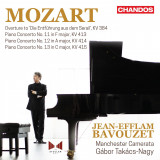 Ref: CHAN 20286 |
MOZART Concertos Volume 9Manchester CamerataGabor Takacs-Nagy conducting Concertos KV 413,414,415 Ouverture to "Entführung aus dem Serail" KV 384 |
|
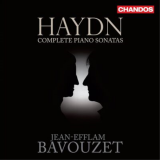 Ref: CHAN2030711 |
HAYDN Complete Sonatas boxCLASSICSTODAY Dave Hurwitz https://youtu.be/CNpCtikqnmU?si=B7ieT-3LIp7VOtkk- FINANCIAL TIMES ‘Bavouzet’s readings have a strong claim to be the finest Haydn playing of recent vintage on the modern piano. GRAMOPHONE "‘A major modern recording landmark in the Haydn discography’ |
|
 Ref: CHAN 20246 |
MOZART Piano Concerto volume 8KV 537, 595With Manchester Camerata and Gabor Takacs-Nagy |
|
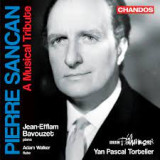 Ref: CHAN 20154 |
Pierre Sancan: A Musical TributePiano, flute solo, orchestral and concerto worksWith BBC Philharmonic, Yan Pascal Tortelier conducting and Adam Walker flute |
|
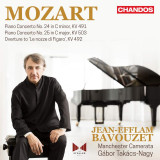 Ref: CHAN 20192 |
MOZART Piano Concertos volume 7KV 491, 503REWIEWS CLASSIC FM Album of the Week February 13, 2023 GRAMOPHONE March 2023 by Patrick Rucker "Certainly these are performances of warmth and beauty that continue to deliver fresh insights even after repeated hearings3 |
|
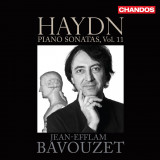 Ref: CHAN20193 |
HAYDN Sonatas Volume 11REVIEWS GRAMOPHONE Sept 2022 Editor's Choice All the buoyancy, charm and wit are there once again... there’s a magical and deeply touching, almost nostalgic hue to this one, as if enjoying the company of a beloved old friend before parting." THE SUNDAY TIMES 21 Aug 2022. 5***** "A triumph!" |
|
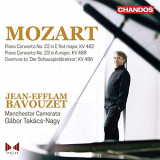 Ref: CHAN 20166 |
MOZART Piano Concertos volume 6KV 482, 488REVIEWS CLASSIC FM Album of the Week March 21, 2022 GRAMOPHONE June 2022 "..attractive, playful impetus that sets the stage for Bavouzet's colourful, operatically oriented solo work...The allegro assai finale has rarely sounded so joyful and unabashedly fun on disc" |
Play Audio Sample
|
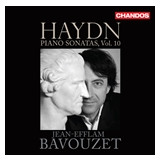 Ref: CHAN 20191 |
HAYDN Sonatas volume 10REVIEWS INTERNATIONAL PIANO "Album of the Month" "The delight of these recordings lies in Bavouzet's pianism. His touch is wonderfully flexible ind in the Allegro movements his sound is bright, incisive and smart as a whip" BBC MUSIC MAGAZINE by Jessica Duchen "One of the best ways to enjoy them (Haydn's piano sonatas) now is Jean-Efflam Bavouzet's ongoing series of recordings and this latest is a splendid addition" |
|
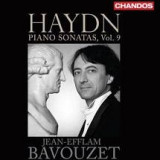 Ref: CHAN 20131 |
HAYDN Sonatas volume 9 |
|
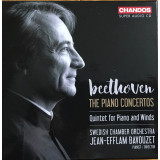 Ref: CHSA 5273 |
BEETHOVEN Complete Piano Concertos * Quintet for Piano & WindsPlay / Direct with Swedish Chamber OrchestraREVIEWS MusicWeb International by Simon Thompson "Of all the Beethoven 250 releases that have come my way in 2020, this is the one I’ve enjoyed the most. Just when you thought there was nothing new to say about these repertoire staples, Jean-Efflam Bavouzet and his Swedish team come along and remind you that they contain bottomless riches, and can still sound freshly minted two centuries after their creation.Several things lie at the heart of the set’s success. Chief among them is Bavouzet’s decision to direct the ensemble from the keyboard. That leads to an uncommon synthesis between piano and orchestra which brings rewards in a sense of directness of communication. There is never a hint of a mismatch or of diverging visions, and the longer rehearsal process reaps great dividends, something Bavouzet himself writes about in the booklet note. The other great element of success is the orchestral sound; the lean transparency that you only really get when a chamber orchestra play this music, and that gives the music a lift and airiness that makes it really special. True, it isn’s always a boon, but in almost every case it reaps huge rewards. The magic that comes when these things combine is evident in the opening tutti of both No. 1 and No. 2. The opening of No. 1, in particular, had me grinning while I listened to it: it’s so rich with bounce and life that it bounds out of the speakers, and the centuries between us and Beethoven seem to melt away as you listen. The orchestra mostly play on modern instruments, but the natural trumpets and timps make a huge difference, giving the sound an extra edge of bite that makes a big difference in the climaxes. Overall, particularly in these early concertos, there is a mood of tremendous good humour. Bavouzet seems to play every run and trill with a smile on his face. The first movement of No. 1 carries a tremendous sense of momentum. The second is taken at a jaunty walking pace, and the bustling finale is a total joy, the piano played with a sparkle and a wink. The orchestra clearly loves every tutti and the overall effect is totally life-affirming. Next to this celebration there is a breezy ease to the opening movement of no. 2, with an occasional lean into a string phrase that adds a little spice and keeps the listener curious. There follows an easy charm to the slow movement: it’s lovely, but it doesn't take itself too seriously and so has a relaxed appeal. Likewise, the finale bustles unfussily. Incidentally, Bavouzet plays the cadenzas that Beethoven wrote out in 1809, and builds each of them organically into the structure, particularly the impressive fugue in that of No. 2’s first movement. In the opening of No. 4, gorgeously soft strings answer the piano’s opening question, but the rest of the movement is more pacey than you might expect, and overall rather lively. Bavouzet seems to want to banish any impression of the Elysian Fields: instead this music has too much life in it to speak of other-worldly bliss. In fact, there is a lovely sense of good humour throughout. It’s definitely on the fast side, too much so for some, and I'm not sure I'd always want my Beethoven to sound like this, but it's an exciting alternative, and only occasionally does it feel rushed. The second movement is clipped and urgent, more con moto than Andante, but the finale feels very natural, and perfectly balanced with the added trumpets and timps, particularly in the exciting dash to the finish line. The set is crowned with a fantastic rendition of the Emperor. Again, it’s definitely on the fast side, so if you’re a fan of Klemperer’s approach then you should stay away, but the energy of the opening tutti had me grinning broadly throughout. Bavouzet’s piano line sparkles throughout, with never the tiniest hint of heaviness, or of being intimidated by the scale of the work he is performing. Throughout the first movement things are pert and purposeful and, repeatedly, Bavouzet even manages to make it sound like a dance. How much more so the finale, which bounds out of your speakers with unstoppable energy. Remarkably, Bavouzet still keeps up an overall legato of the line throughout so that nothing ever feels jagged or fragmentary, right down to the ebullient storm over the finish line. In this company the slow movement is surprisingly restrained, taken at a leisurely walking pace and never pushing the speed. The piano unfolds gently from within, its soft, dreamy hue completely bewitching, and the orchestral sound is a total delight, too, the strings and winds seeming to caress one another as they approach the end of the movement. Only in No. 3 did my enthusiasm wane slightly. Again, the approach is fast, though this time it slightly lessens the drama rather than intensifying it, particularly in the first movement. The orchestra makes up for it in the coda, which sounds positively febrile with its lithe strings, acidic winds and clipped, focused tutti sound. However, the slow movement is the only place in the set where I noticed the disadvantages of using a chamber orchestra. Here you lose some of the richness: the winds, in particular, sound a little too transparent, almost to the point of spareness. They’re still beautiful, however, and the finale is pleasingly mischievous if, again, on the light side. The set’s USP is the “extra”, the Grand Quintet for piano and winds. Here, however, it isn’t just a filler: it’s a total delight. The blend of the five instruments is sensational: even though the clarinet is so centrally important here, this feels like a union of equals, and the Chandos recorded sound really comes into its own. The piano’s theme, introducing the main Allegro, feels like welcoming an old friend, and the way the winds respond speaks of how much they must have enjoyed making this set. There follows a sensationally beautiful slow movement and a delightfully chirpy finale. In short, wonderful. The slightly eccentric speeds and the less powerful third concerto are the only things stopping me from giving this a complete thumbs up (and our “Recommended” award), and I still prefer Howard Shelley and Harnoncourt/Aimard as overall recommendations for the complete set of concertos; but Bavouzet’s set remains a breath of fresh air, and I’ll go back to it to rediscover the celebratory joy of these works. Despite the blemishes, my initial judgement remains unchanged: of all the Beethoven 250 releases that have come my way in 2020, this is the one I’ve enjoyed the most. Simon Thompsonhttp://www.musicweb-international.com/classrev/2020/Nov/Beethoven-PCs-CHSA5273.htm FANFARE Magazine Jan 2021This article originally appeared in Issue 44:3 (Jan/Feb 2021) of Fanfare Magazine. BEETHOVEN Piano Concertos Nos. 1–5. Quintet for Piano and Winds, op. 161 • Jean-Efflam Bavouzet (pn, cond); 1Karin Egardt (ob); 1Kevin Spagnolo (cl); 1Mikael Lindström (bn); 1Terése Larsson (hn); Swedish CO • CHANDOS 5273 (3) Download: 189:00) Reviewed from a WAV download: 44.1 kHz/16-bit To close out the Beethoven Sestercentennial, Jean-Efflam Bavouzet here follows up his very successful, critically acclaimed cycle of the composer’s piano sonatas with a three-disc set of the five numbered piano concertos, plus a filler in the form of the Piano Quintet, op. 16, performed by Bavouzet and first-chair members of the Swedish Chamber Orchestra. Just in the last few months, not counting this new Bavouzet set, there have been no fewer than five complete Beethoven piano concerto cycles by Jan Lisiecki, Ronald Brautigam, Stewart Goodyear, Mitsuko Uchida, and Oli Mustonen. While each pianist performed admirably and had his or her positives recounted in previous reviews, the contest ended with no first prize awarded. We still awaited a definitive winner, the blockbuster. I’m here to say that Jean-Efflam Bavouzet is it. Fresh from his survey of the sonatas, Bavouzet is steeped in Beethoven. He lives and breathes the composer’s music, and he’s a stickler for the details of the scores, their place in time, and how they came to be as we know them today. For example, one notes right off the bat that Bavouzet begins his journey through the concertos, not with the C-Major (No. 1), but with the B♭-Major (No. 2) because though published second, it was composed first. And that is majorly significant in terms of orchestration. The B♭-Major Concerto is only modestly orchestrated, following earlier models in which a limited number of wind instruments essentially doubled the strings or were used in fanfare-like passages in between solo episodes. For the B♭-Major Concerto, Beethoven calls for a single flute, plus oboes, bassoons, and horns in pairs, and strings. That’s it. Then, just a year or so later, in the C-Major Concerto, Beethoven takes a major step forward in orchestration. Now, in addition to the flute, plus oboes, bassoons, and horns in pairs, he adds two clarinets, two trumpets, and timpani. The size of the orchestra increases, as does the size of piano, for as the program note tells us, it was approximately at this time that the range of the keyboard increased from five to six and a half octaves. To present the first two concertos in their number order instead of their composition order would be to look backward. Bavouzet’s cadenzas are all Beethoven’s. There’s no spray-painting the scores with the the performer’s personal graffiti. The album note reminds us that Beethoven’s cadenzas were a work in progress until he wrote them all out in final form in 1809, contemporaneously with the composition of the “Emperor” Concerto. Just one of the things that I find amazing and thrill to in Bavouzet’s readings is his go-light approach to the sustaining pedal. The result is light between the notes which allows for the impacts of sforzandos and accents to ring out and report with sharp bite. Listen, for example, to Bavouzet’s entrance in the Third Concerto. The double scales aren’t shmeared; every note is clear and evenly weighted because there’s space between them. Orchestral definition is likewise razor-sharp, bringing into relief the subtlest gradations in dynamics and nuances in phrasing. From the gripping Sturm und Drang of the Third Concerto’s first movement, Bavouzet takes us into the realm of the sublime with the first movement of the Fourth Concerto. I’m not sure I can even find words to describe the feeling of blessed serenity he instills in those opening solo measures. I’ve never heard any pianist find in them Bavouzet’s particular mix of holiness, awe, and benediction. It’s as if, concentrated and revealed in those five bars, is the meaning of everything. What a masterstroke by Beethoven to follow it with the orchestra entering in the “wrong” key, as if to say, “You haven’t earned the right to enter yet into that exalted realm; you must struggle for it, and that effort lies in the movement ahead.” Only three years may separate the Third Concerto (1802–03) from the Fourth (1805–06), but in that time Beethoven crossed the divide between the Classical and the Romantic. As the liner note points out, “The G-Major Concerto belongs to that annus mirabilis in Beethoven’s career, which also saw the completion of the Fourth Symphony, the Violin Concerto, the three “Razumovsky” Quartets, and the revision of his opera Leonore (as Fidelio).” I would add to that list the Triple Concerto, long considered one of the lesser gems in Beethoven’s canon that is actually quite novel in many ways and an important landmark on his way to becoming a Romantic composer. Bavouzet’s “Emperor” is a reading etched in empyrean majesty. It’s high-minded, lofty, inspiring, and ennobling. And yes, for those wondering about Bavouzet’s technical execution, he nails the passage in descending alternating thirds, fourths, sixths, and sevenths that form chords between the two hands moving in contrary motion to each other at the end of the first movement. Not once in all five concertos does Bavouzet, either as pianist or conductor, miscalculate the affect of the music or the effect he wishes to make. I know that different listeners hear Beethoven in different ways and experience different emotional responses to his music. But that very fact is testament to its communicative power. For me, I can’t imagine wanting to hear anyone in these concertos ahead of Bavouzet. He tells me everything I want to hear in these works, fulfilling my deepest convictions as to their meaning, and my every expectation for how their stories need to be told. Beethoven’s early Quintet in E♭-Major for Piano, Oboe, Clarinet, Bassoon, and Horn makes for the perfect post-five-course meal digestif. The work is clearly a nod to Mozart’s Quintet in E♭, K 452, for the same complement of instruments. In concert with Bavouzet, the Swedish Chamber Orchestra’s first-chair players are featured here in a performance that showcases their individual and ensemble talents. Jean-Efflam Bavouzet’s Beethoven receives the strongest and most urgent recommendation I can give. If any further incentive is needed, Chandos’s recorded sound is stunning, and the three-disc set in physical form is SACD. Jerry Dubins |
|
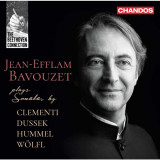 Ref: CHAN20128 |
The Beethoven ConnectionCLEMENTI Sonata in A major Op.50 No.1DUSSEK Sonata in F sharp minor Op.61 C211 'Élégie harmonique HUMMEL Sonata in F minor No.3 Op.20 WÖLFL Sonata in E major Op.33 No.3 The New York Times interview with David Allen: https://nyti.ms/2MGPnkr FINANCIAL TIMES ***** by Richard Fairman "All four will win admirers in Bavouzet’s dazzlingly persuasive performances. " THE CLASSICREVIEW by David A. McConnell June 8 2020 "...the most beguiling elegance, and of delicacy.” These qualities are readily apparent in Bavouzet’s performance – anyone owning his Beethoven sonata cycle will hear how differently he phrases and colors Hummel’s piano writing..supplemental essay by Bavouzet describing how these sonatas relate to Beethoven’s music..brilliant and passionate scholarship!" |
|
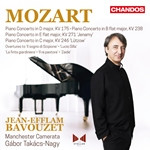 Ref: CHAN 20137 |
MOZART Piano Concertos KV175, KV238, KV246, KV271Manchester CamerataG0bor Takàcs-Nagy conducting REVIEWS Album of the Week THE TIMES Album of the Week ClassicFM Trophée from Radio Classique |
|
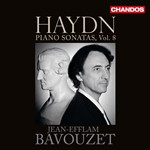 Ref: CHAN 20087 |
HAYDN Piano Sonatas volume 8 |
|
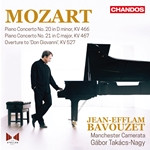 Ref: CHAN 20087 |
MOZART Piano Concertos KV466, KV467, Don Giovanni Ouverture Manchester Camerata Gàbor Takacs-Nagy conductingREVIEWS THE CLASSIC REVIEW by Tal Agam June 6, 2019 "Not only does Bavouzet ads additional elements to the piano part, but he also rethinks the phrasing and length of notes, adding an additional element of suspense and curiosity. All additions are appropriately done and never seem to be self-indulgent, the results making this movement sounds like “on the spot” music making...The rest is an exemplary exchange of ideas from the soloist and orchestra, concluding a performance of K.467 for the books" |
|
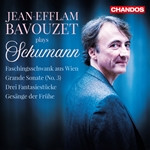 Ref: CHAN 20081 |
SCHUMANN Faschingsschwank aus Wien* Concert sans Orchestre Op.14 * Drei Fantasiestücke Op. 111 * Gesänge der FrüheREVIEWS GRAMOPHONE by Harriet Smith Febr 2019 https://www.gramophone.co.uk/review/jean-efflam-bavouzet-plays-schumann BBCRadio3 Andrew McGregor February 16, 2019 Schumann's Concerto Without Orchestra gives you an idea of the scale of the ambition here, ambition that Jean-Efflam Bavouzet meets head on in this impressive performance. Epic sweep and large Romantic gestures from the start, but he is also alive to the capriciousness and delicacy of the writing, while keeping a firm grip on the sonata’s structure. The finale, marked by Schumann As fast as possible, isn’t just a welter of flashy finger work: everything is phrased and shaped before Bavouzet shifts into overdrive for the exhilarating coda. Schumann’s Carnival Scenes from Vienna is played with real panache. And how you react to the Dawn Songs at the end of the recital might depend on whether you view them as something apart - Schumann’s last will and testament. Here they’re not over sentimentalised. Jean-Efflam Bavouzet plays Schumann is new from Chandos. More please! THE GUARDIAN by Fiona Maddocks 17 Febr 2019 "the Frenchman knows exactly what he is doing: the finale is a masterclass in precision and clarity, even at speed, its more lyrical writing brought fully alive." https://www.theguardian.com/music/2019/feb/17/home-listening-schumann-gautier-capucon-jean-efflam-bavouzet-radio-3-berlioz-the-ultimate-romantic |
|
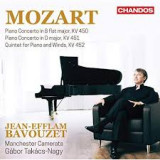 Ref: Chandos 20035 |
MOZART Piano Concertos KV450, KV451, Quintet for Piano and Winds KV452 Manchester Camerata Gàbor Takàcs-Nagy conductingBBC MUSIC MAGAZINE January 2019Concerto Choice of the Month REVIEWS BBC Music Magazine by Erik Levi Jan 2019 "Energetic Mozart up there with the very best" CLASSICAL SOURCE by Colin Anderson Jan 2019 http://www.classicalsource.com/db_control/db_cd_review.php?id=15925 "Three consecutive Köchel numbers, so it’s strange to have K451 placed before K450, and if you are going to tinker with the catalogue order why not have the Quintet separating the Concertos for a difference of medium? It’s academic of course given the listener has control of what to play and the order. I guess K451 opens the programme because with its martial trumpet and drums it is more arresting than the courtly K450, and Gábor Takács-Nagy makes it vivid and dynamic, the Manchester Camerata incisive and lyrical, complemented by Jean-Efflam Bavouzet’s scintillating playing, brilliant and bravura, and perfectly balanced with the ideally captured reach-out-and-touch orchestra, all suggesting that the relatively new Stoller Hall (associated to Chetham’s School of Music) boasts an enviably impressive acoustic, unencumbered, faithful and tangible. With a dreamy slow movement, expressive woodwinds to the fore, and a dashing Finale, this K451 really speaks to the senses. So too the whimsies of K450, formalities with a flounce in the first movement, enjoyed by the performers and – with no sound barrier in the way – shared with us. In addition to the agreeable opening Allegro there is a darkly beautiful slow movement, given here with poetic space, and the elegantly cheerful Finale. As for the Piano and Wind Quintet, once again the recording preserves every note and nuance, friends making civilised conversation, mostly intimate, always intelligent, a lively and considered discourse, give and take, changes of colour and character." |
|
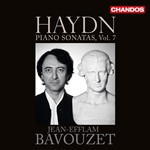 Ref: CHAN10998 |
HAYDN Piano Sonatas Vol. 7 Hob.XVI/5 * Hob. XVI/31 * Hob. XVI/6 * Hob. XVI/4 * Hob. XVI/ 48Editor's Choice GRAMOPHONE September 2018Instrumental Choice BBC MUSIC MAGAZINE Oct 2018 REVIEWS: BBC MUSIC MAGAZINE INSTRUMENTAL CHOICE by Michael Tanner Oct 2018 "Bavouzet performs with grace ... brings ideal clarity to these elegant works" GRAMOPHONE by David Threasher Sept 2018 Jean-Efflam Bavouzet’s series of Haydn’s piano sonatas reaches Vol 7, borne aloft by the momentum of almost unanimously laudatory reviews and a string of accolades including a brace of Gramophone Editor’s Choices over the past eight years. There’s no sign of a mid-series lull, either, on the new disc, which, like its predecessors, offers listening delight from first note to last. These five sonatas range from the early No 6 (1760 or before), unusually in four movements and designated ‘Partita’, to the two-movement No 48 (1789), commissioned by Breitkopf to ‘raise the level of a “musical potpourri”’ (annotator Marc Vignal) that the company was planning. The other composers and works in this ‘potpourri’ are not mentioned in the booklet but it can only be assumed that its level was indeed raised by this sonata of utmost individuality: an Andante more akin to a free fantasia and a Presto in sonata-rondo form – a favourite style of Haydn’s but one not exploited anywhere else in his piano music. There’s also the beautiful E major, No 31 (1776), the serenity of whose opening Moderato is cast into sharp relief by the austere, Bachian three-part invention of its central Allegretto and the antics of its variation finale. Two other works, No 5 (described as ‘Divertimento’) and No 57 are of dubious provenance; Vignal expertly delineates the authenticity or otherwise of all these works and untangles their chronology and the conflicting numbering systems, while offering little further insight into the music itself. The insight is communicated by the fingers of Bavouzet and by his palpable affection for these works. As before, the score is a starting point for him, not holy writ, and he grants himself full liberty to negotiate with Haydn, ornamenting and varying as he goes along, yet never obscuring the music’s purpose or pulling the spotlight away from it and towards himself. His Yamaha sounds well in Potton Hall, a little more presently recorded than Marc-André Hamelin (at Henry Wood Hall) for Hyperion. There is still some way to go but this volume is another stepping stone towards what must surely end up as a major modern recording landmark in the Haydn discography. CLASSICALSOURCE by Colin Anderson July 2018 "Joseph Haydn and Jean-Efflam Bavouzet: all-round geniuses... capricious smile-inducing dance with mischievous episodes, Bavouzet not allowing the Presto marking to get in the way of clarity – there are a lot of notes and ornaments to fit in – his Yamaha the perfect partner, recorded intimately to the rescue of everything the pianist touches and pedals; and, by contrast, the Adagio of 13/6 (the four-movement Sonata) is wonderfully lyrical and tender, loaded with emotion: earworms come in different guises." http://classicalsource.com/db_control/db_cd_review.php?id=15604 LE DEVOIR by Christophe Huss July 2018 Jean-Efflam Bavouzet construit l’intégrale des sonates de Haydn qui fera date au piano" https://www.ledevoir.com/culture/musique/533257/vitrine-musique-joseph-haydn-sonates-pour-piano-volume-7 MUSICWEB INTERNATIONAL RECORDING OF THE MONTH by Michael Greenhalgh Sept 2018 "There's no better interpreter of Haydn today than Bavouzet: he has the secret of unlocking both his individuality and sheer quality" http://musicweb-international.com/classrev/2018/Sep/Haydn_piano_v7_CHAN10998.htm |
|
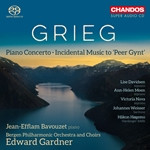 Ref: CHAN5190 |
GRIEG ConcertoBergen Philharmonic OrchestraEdward GARDNER conducting FIRST Place on Official Specialist Classical Chart Top 30 Jan 12, 2018 GRAMOPHONE by Harriet Smith January 2018 "Bavouzet bewitches in the slow movement, not just in the clarity of his lines but also in the sense of ebb and flow (soloists must love Gardner for his empathetic support)...Bavouzet is whirlingly virtuoso in the finale" CLASSIC FM Album of the week January 2, 2018 https://www.classicfm.com/music-news/grieg-rossini-hoffmeister/ |
|
 Ref: CHAN 10960 |
BEETHOVEN Complete Piano Sonatas BoxREVIEWS MUSICWEB INTERNATIONAL by Dominy Clements February 2018 "The final Sonata Op. 111 is given a tremendously vibrant performance by Bavouzet, who again rises to the massive challenge of the first movement’s remarkable counterpoint, making those voices thrown around all over the place into something with its own animated inner-life, a place of excitement rather than one of baffling entanglement....Bavouzet’s traversal of those seemingly unplayable trill passages is magical.....Jean-Efflam Bavouzet has given us a set of the Beethoven piano sonatas with clarity of vision, while at the same time full of vitality and breathtaking virtuosity.....Indeed, each time I pick out another disc to revisit I learn new things about both Beethoven and Bavouzet’s performances – an evolution that promises to bring the satisfaction of discovery for a long time to come." |
|
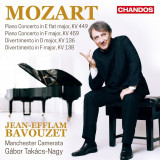 Ref: CHAN 10958 |
MOZART Piano Concertos KV449and KV459, Divertimentos KV136, KV138 Manchester Camerata Gàbor Takàcs-Nagy conductingREVIEWS ClassicalSource ***** by Anthony Hodgson November 2017 http://www.classicalsource.com/db_control/db_cd_review.php?id=14933 It is always refreshing to hear central movements of Mozart Piano Concertos moving forward purposefully and this is how Jean-Efflam Bavouzet views them. In his booklet note he mentions Mozart’s letter to his father written during 1784 (both K449 and K459 were composed then) in which he points out that none of his Concertos of that year includes a slow movement. While not eschewing expressiveness, a firm momentum is afforded the more thoughtful melodies and it typifies Bavouzet’s approach to K449. Given rhythmically secure accompaniment the music moves boldly, welding cadenzas firmly into the structure. With suitably weighty bass strings the central Andantino is accompanied colourfully and the forcefulness of the (modern) piano in the Finale is suitably matched. Delightful bouncing rhythm here – simple themes yet each makes its point. It’s sensible to place the two Divertimentos between the Concertos and the excellent acoustic of the RNCM Hall certainly enriches the sound. Gábor Takács-Nagy tends to phrase melodies in a somewhat legato manner with full, well-sustained chords and occasionally violinists are permitted a touch of portamento. Crescendos are added to rising phrases, restatements of tunes are sometimes played more quietly and Takács-Nagy makes only the first-time repeat in each movement. I was surprised however to hear the first eight bars of the Finale of K138 reprised because it’s not marked and the repetition spoils the symmetry. The Concerto K459 sounds a little more mature despite having been composed close to K449. Here is an extensive first movement given a confident reading with the Manchester Camerata notably well-balanced against Bavouzet, woodwinds notably clear. Bavouzet’s is a noble conception and there is complete rapport with Takács-Nagy. There is much room for thoughtful expression in the central Allegretto and Bavouzet provides it – a moving, sensitive reading – and the Finale exudes joyfulness: Bavouzet’s quaint moment of hesitation in the cadenza shows that he is at-one with Mozart when it comes to wittiness. |
|
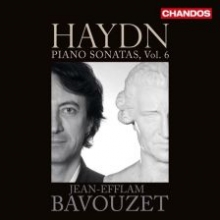 Ref: CHAN10942 |
HAYDN Piano Sonatas Vol.6 Hob XVI/2 * Hob XVI/28 * Hob XVI/43 * Hob XVI/33 * Hob XVI/21GRAMOPHONE CRITICS' CHOICE June 2017REVIEWS by Stephen Plaistow June 2017 "a level of technical perfection allied to insight, rigorous intellectual curiosity and the probing instincts of a distinguished performer that have never been brought to bear so acutely and consistently on this part of Haydn’s activity" |
|
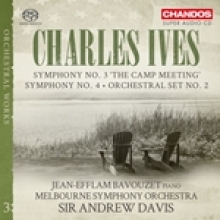 Ref: CHSA 5147 |
IVES Symphony No 3, Symphony No 4Melbourne Symphony OrchestraSir Andrew Davis conducting Reviews: THE GUARDIAN by Andrew Clements March 9 2017 "with the solo piano, played by Jean-Efflam Bavouzet, more than usually prominent, teases everything out with marvellous clarity" CLASSICAL MUSIC MAGAZINE by Guy Wheaterall February 2017 "Bavouzet is the very definition of luxury casting, here on top form" |
|
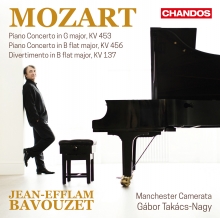 Ref: Chandos 10929 |
MOZART Piano Concertos KV 453 and KV 456, Divertimento KV 137 Manchester Camerata Gàbor Takàcs-Nagy conductingPIANIST MAGAZINE Editors Choice Febr March 2017REVIEWS PIANIST Magazine Jan 2017 Jean-Efflam Bavouzet plays dazzling Mozart concertos, Bavouzet casts magic over the orchestra’s background accompaniment with his faultless, seamless execution of passagework and his exquisite phrasing of melodies. MUSICWEB INTERNATIONAL, November 2016 by Marc Rochester http://www.musicweb-international.com/classrev/2016/Nov/Mozart_PCs_CHAN10929.htm FINANCIAL TIMES Oct 14 2016 by Richard FairmanMusic Mozart: Piano Concertos K453 and K456 The solo playing sparkles in highquality performances with the Manchester Camerata under Gábor Takács-Nagy Jean-Efflam Bavouzet (Chandos) In a performer’s note Jean-Efflam Bavouzet says he finds himself poised “on a razor’s edge”. How much should the pianist do to recapture the sense of novelty that Mozart’s piano concertos would have had at their premieres? On the face of it these performances with the Manchester Camerata under Gábor Takács- Nagy are plain high-quality. The solo playing sparkles, the orchestra is alive with detail, everything a delight. But there is a twist: Bavouzet adds the option of his own, anachronistic cadenzas. Listeners can choose between those or Mozart’s originals. It is a win-win situation. |
|
 Ref: CHAN 10925 |
BEETHOVEN Sonatas Vol.3 Op.54, 57 Appassionata, 78, 79, 81a Les Adieux, 90, 101, 106 Hammerklavier, 109, 111GRAMOPHONE Recording of the Month Dec 2016REVIEWS GRAMOPHONE http://www.gramophone.co.uk/review/beethoven-piano-sonatas-nos-22-32-bavouzet FINANCIAL TIMES 26 December 2016 by Richard Fairman "Another rewarding way to spend the Christmas break would be to absorb the third and final volume of Jean-Efflam Bavouzet’s enthralling traversal of Beethoven’s piano sonatas." https://www.ft.com/content/e0580ef0-c00b-11e6-9bca-2b93a6856354 |
|
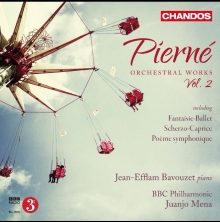 Ref: CHAN10871 |
Gabriel PIERNÉ Volume 2 BBC Philharmonic Orchestra Juanjo MENA conducting Paysages franciscains Op.43 Les cathédrales Scherzo caprice Op.25 Poème symphonique Op.37 Fantaisie ballet Op.6 Nocturne Op.40 No.2 Etude de concert Op.13Reviews: THE GUARDIAN by Andrew Clements August 2015 https://www.theguardian.com/music/2015/aug/26/pierne-orchestral-works-cd-review-jean-efflam-bavouzet-juanjo-menadmirers of the music of Gabriel Pierné (1863-1937), have had to wait patiently for the second volume of Chandos’s series. The first instalment was released four years ago, and if that proved rather disappointing, its successor is much more convincing and enjoyable. The main work on that first disc was Pierné’s early piano concerto, and it is single-movement pieces for piano and orchestra that dominate this collection, too. There are three of them here, ranging chronologically from the Fantasie-Ballet of 1886 (the year before the concerto) to the Poème Symphonique, which was composed in 1901. These pieces are pleasant, wonderfully fluent but ultimately unremarkable examples of French late romanticism, which hardly stray beyond Pierné’s musical starting points in Massenet, with whom he studied composition, and César Franck, who was his organ teacher and whom he succeeded as organist of Sainte-Clotilde in Paris in 1890. But it’s the two later orchestral works not involving a solo piano, the Paysages Franciscains of 1919 and Les Cathédrales, the prelude he composed four years earlier for a dramatic poem by Eugène Morand, that are much more intriguing. Pierné conducted the premiere of Stravinsky’s Firebird in 1910, as well as concert performances of Debussy’s Images and Jeux, and Ravel’s Daphnis et Chloé, and their modernism gradually percolated through into his own music. The brief, rather gloomy Les Cathédrales, haunted by transformations of the Marseillaise, is striking without pushing the stylistic envelope too far, but the Paysages Franciscains, based on three scenes from the life of St Francis of Assisi, takes the language of Debussy and Ravel fully onboard and uses it very skilfully. Each piece is perfectly conceived in orchestral terms, and make up a much more substantial work than the pastoral title suggests. It’s also beautifully rendered by Juanjo Mena and the BBC Philharmonic, while Jean-Efflam Bavouzet is not only a dazzling soloist in the three concertante works, but adds two of Pierné’s solo piano pieces, the Nocturne en Forme de Valse and a concert study, for good measure. |
|
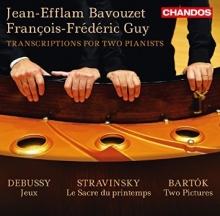 Ref: CHAN 10863 |
DEBUSSY Jeux - STRAVINSKY Le Sacre du Printemps - BARTOK Two Pictures , with François Frédéric GuyREVIEWS THE SUNDAY TIMES June 7, 2015 Album of the Week THE GUARDIAN June 14, 2015 by Fiona Maddocks https://www.theguardian.com/music/2015/jun/14/jean-efflam-bavouzet-francois-frederic-guy-transcriptions-for-two-pianists-review-debussy Three 20th-century orchestral scores, Bartók’s Two Pictures, Debussy’s Jeux and Stravinsky’s The Rite of Spring, all dating from 1910-13 and all linked (as the detailed CD booklet explains), are brought to life in the hands of two exceptional French pianists. The central interest is the ballet Jeux. One of the world’s outstanding Debussy interpreters, Jean-Efflam Bavouzet has added to his complete Chandos recordings with his own transcription for two pianos. Written late in Debussy’s life for Nijinsky, Jeux involves an emotionally erotic and harmonically daring game of tennis. Bavouzet and his well-matched partner, François-Fréderic Guy, play with nimble grace, capturing the works wit and mystery. This gripping album is dedicated to Pierre Boulez, guru and enabler, for his 90th birthday. TELERAMA June 10, 2015 by G Macassar "enregistrement d'une ferveur si communicative" |
|
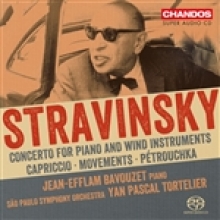 Ref: CHSA 5147 |
Stravinsky Concerto for Piano and Wind Instruments Capriccio Movements Pétrouchka with São Paulo Symphony Orchestra, Yan Pascal TORTELIER conductingREVIEWS THE GUARDIAN January 18, 2015 by Fiona Maddocks "Energy and precision from Bavouzet ..It’s hard to imagine better." |
|
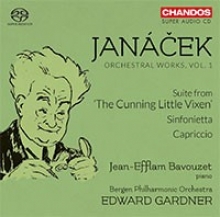 Ref: CHSA5142 |
JANACEK Orchestral Works Vol. 1. Sinfonietta, CAPRICCIO. Suite from The Cunning Little Vixen with Bergen Symphonic Orchestra Edward GARDNER conductingREVIEWS CLASSICALSOURCE September 2014, by Colin Anderson "Advanced and modern Capriccio certainly is but also with a story-telling side that is vividly played-up here, Jean-Efflam Bavouzet and his busy left-hand, all that he requires, painting pictures while his Bergen colleagues become theatrical personages." |
|
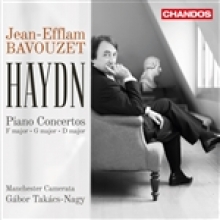 Ref: Chandos CHAN10808 

|
HAYDN Piano Concertos F major * D major * G major with Manchester Camerata, Gàbor TAKÀCS NAGY conductingGramophone EDITOR'S CHOICE September 2014Financial Times ***** September 5 2014 REVIEWS GRAMOPHONE September 2014, by David Threasher "Jean-Efflam Bavouzet has proved himself one of today’s leading Haydn interpreters – amply so on five volumes of sonatas (and counting), each enthusiastically reviewed...The slow movement of the same work he transforms into a solfeggio that unfolds seemingly in a single breath, effortlessly matching the opening violin solo in its vocal expressivity and rising to an almost Argerich-like freedom" FINANCIAL TIMES 5 September, by Richard Fairman "Jean-Efflam Bavouzet adds witty ornamentation, throws in out-of-period cadenzas, and plays with irresistible exuberance.It is a disc that is hard to play without breaking into a smile." CLASSICALSOURCE September 2014, by Colin Anderson Jean-Efflam Bavouzet has been working his way through Haydn Sonatas for Chandos and now joins an orchestra for these three Concertos. This may not be Haydn at his greatest (as is to be found in the numerous Symphonies, String Quartets, Piano Trios and those Sonatas), but each of the nine movements here is enjoyable and reflects Haydn’s remarkable ability to write music that is consistently fresh, inventive and thoroughly captivating. Never more so than here, for the Manchester Camerata and Gábor Takács-Nagy (the founder of the Takács Quartet) offer stylish, detailed and dynamic support to Bavouzet, and he is the absolute master of the solo parts, playing with relish, imagination, a range of touch and volume, and with devotion and affection, pointing up with crispness and shapeliness Haydn’s urbanity and his delicious surprises; and it’s Bavouzet who contributes the cadenzas, each a winner. The slow movements are full of beguiling expression, not least that in the F major Concerto, a song without words, opening with a beautiful violin solo from Giovanni Guzzo, and the finales fizz along with irrepressible brio, especially the familiar, joyfully scampering ‘Rondo all’Ungherese’ that closes the D major example with such memorable tunefulness and élan. The opening movements tend to be unhurried and welcoming and full of good things. These are marvellous performances of very agreeable music and the sound quality is ideally balanced between soloist and ensemble and also between warmth and clarity. |
|
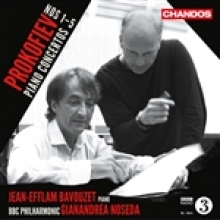 Ref: Chandos CHAN 10802 

|
Prokofiev Complete Piano Concertos with the BBC Philharmonic Orchestra, Gianandrea NOSEDA conductingGRAMOPHONE Recording of the Month March 2014GRAMOPHONE Concerto Award of the Year 2014 REVIEWS “Following Jean-Efflam Bavouzet and Gianandrea Noseda’s superlative Bartók Concerto cycle here are their attention-grabbing interpretations of Prokofiev’s characterful five of that genre. With Bavouzet’s lively temperament allied with Noseda’s fierce attention to detail, no listener will come to these performances without hearing something new in these works…” Daniel Jaffé – BBC MUSIC MAGAZINE – March 2014 "Superb Prokofiev piano concerto cycle... Bavouzet is on magnificent form" Rob Cowan - GRAMOPHONE - March 2014 "Bavouzet pitches into Prokofiev’s truculent writing with all the vigorous conviction he can muster.. One senses that Bavouzet needs to get this score out of his system and he plays as if his life depends on it. Bavouzet’s particularly impressive and thrilling playing of the third movement Toccata meets a very satisfying rendition of the introspective and highly lyrical Larghetto..In short this is an indispensable set for Prokofiev admirers and all enthusiasts of 20th century music." MUSICWEB INTERNATIONAL - Michael Cookson- - April 2014 |
|
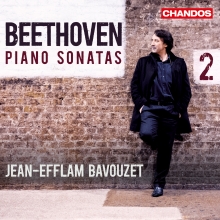 Ref: CHAN 10798 
|
BEETHOVEN Sonatas Vol.2 Op22, Op26, Op27, Op28, Op31, Op49, Op53 ¨Waldstein¨, Andante FavoriGramophone EDITOR'S CHOICE February 2014REVIEWS FINANCIAL TIMES - January 10 2014 by Andrew Clark The “Moonlight” radiates mystery and momentum, the “Tempest” has fabulous intensity (and a graceful touch), while the “Waldstein” is treated to a performance of unmitigated rapture. Roll on Volume Three." |
|
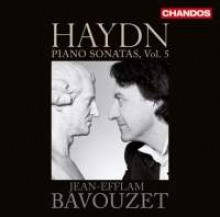 Ref: CHAN 10763 
|
HAYDN Piano Sonatas Vol.5CHOC de Classica - June 2013 REVIEWS FINANCIAL TIMES April 5, 2013 "Bavouzet reveals expressive charm and craftsman-like ingenuity in his latest disc Received opinion has it that, even for keyboard aficionados, Haydn’s piano sonatas are an acquired taste. You would never know it from Bavouzet’s survey, now at roughly halfway mark. These are landmark recordings, thanks to the French pianist’s stylistic command and sheer delight in the music. The latest disc is dominated by the jolly Sonata No 15 in E, the tripping ornamental motifs of which tumble out with a mixture of nonchalance and elegance. The quietly consoling Andante of the Sonata No 37 in E is scarcely less impressive, and even if the three shortish sonatas in two movements Opus 37 offer scant opportunity for virtuoso display, Bavouzet reveals the music’s expressive charm and craftsman-like ingenuity." By Andrew Clark "Bavouzet ose ici un ton tendre et personnel... semble avpir découvert un Haydn rarement entendu: le commentateur immensément sensible des choses humaines qui s'exprime dans ces sonates pour piano" Eric Taver |
|
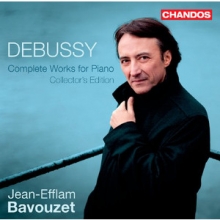 Ref: CHAN 10743(5) |
DEBUSSY Complete Piano WorksREVIEWS SINFINI November 2012 by Tim Parry "His blend of cool emotional engagement and sensuality of touch is ideally suited to this music" -- The fifth and concluding album brings together the ballets Khamma, Jeux and La Boîte à joujoux, all far better known in their orchestral guise, but here performed in Debussy’s initial versions for solo piano. This album was an Editor’s Choice in the magazines Gramophone and Classic FM and nominated for a Gramophone Award in 2010, in the instrumental category. |
|
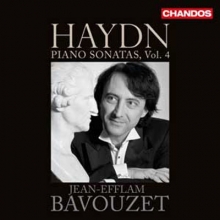 Ref: CHAN 10736 
|
HAYDN Piano Sonatas Vol.4BBC Music Magazine - November 2012Performance ***** Recording **** REVIEWS BBC MUSIC MAGAZINE - November 2012 GRAND AND DAZZLING HAYDN "Bayan Nothcott enjoys Jean-Efflam Bavouzet's stunning sonata recital. Was Haydn being gently ironic when he titled his Variation sin F Minor Un piccolo Divertimento? This is actually one of the moste serious and revealing works in his keyboard output - he even took the trouble to extend and intensify its dramatic coda before publication. In addition to the familiar final version, Jean-Efflam Bavouzet also offers us the opportunity to hear the work with Haydn's unpublished original coda. Either way, this is among the finest accounts on disc: searchingly nuanced from moment to moment yet never losing its grip on the work's tragic progress. Bavouzet's reading of the three selected Sonatas in this latest instalment of his ongoing series are all equally illuminating in different ways. He's wonderfully dry and droll in the opening movement of the early Sonata No.30 (Hob.XVI: 19), and dazzling in the quick changes of its rondo-variaton finale. He brings an almost Chopinesque resonance to the lilting Siciliana-like Adagio of the Sonata No.38 (Hob.XVI: 23) and crisp grandeur to the discursive opening of the more popular-style Sonata No. 40 (Hob.XVI: 25) written for Count Nikolaus Esterhazy. The decorations Bavouzet adds from time to time always sound spontaneous and are often varied in repeats. He inserts the cadenza by Zoltan Kocsis at the pause near the end of the Andante of the Sonata No.30, offering interesting comments on Haydn's themes." INTERNATIONAL RECORD REVIEW - September 2012 "Jean-Efflam Bavouzet is nothing if not a versatile pianist. For Chandos, with which he has an exclusive contract, he has made many forays into the music of his native country; unsurprisingly, his recordings of Debussy in particular have been hailed as sympathetic and idiomatic, while losing nothing by being notably clear-sighted and well-focused. His 'turn' to Haydn - this is the fourth volume in a series that remains a work in progress, and a project for the long term: previous issues were reviewed in March 2010 and April and November 2011 - demonstrates identical virtues when applied to Haydn's vastly different idiom. Here, then, are three more Haydn sonatas along with a famous set of variations, done on modern piano with notable attention to clarity and texture: Bavouzet's articulation and scupulous pedalling feel always in style, never anachronistic. Nor does he allow himself over-much freedom with the texts: he may just add an occasional mordent or turn in a repeated section (and he is generous with repeats, obediently playing second halves when prescribed), but resists any temptation to Robert Levin-like elaboration. A six-four chord near the end of the Andante of the D major Sonata prompts the inclusion of a cadenza by another pianist with a deep love of Haydn, Zoltan Kocsis, a moment that certainly hints at the existence of other pianistic idioms, but it is very brief: blink, and you might well miss it. There is one more textual curiosity. The last track of all is an alternative version of the end of the late great set of Variations in F minor: looking at the MS some years ago, Bavouzet found that Haydn had first thought to preface the conclusion with a very short cadenza, subsequently crossing it out. He wrote it out for himself, and includes it here. However, it is certainly worth acquisition not only for Bavouzet's positive assets as outlined above, to which can be added a generous dose of wit and sparkle but also, of course, for the marvellous music it contains.The F minor Variations may well be familiar as one of Haydn's greatest keyboards works, with their huge and sombre coda finally dissolving pianissimo. The composer's designation of them as Un piccolo divertimento must have preceded the actual work of composition! What ingenuity and originality and teasing of player and listener alike there is in the sonatas that Bavouzet has carefully placed alongside each other. The D major - another Divertimento! - is the longest of them, conceivably intended to woo the public in concert rather than being the kind of connoisseurs' piece like the other two: so the opening movement with its repeated notes seems almost light-hearted: I'm tempted to call it gay. The finale is a kind of two-part invention, in perpetual motion." By Piers Burton-Page FINANCIAL TIMES - September 7, 2012 "More Bavouzet – and more delights, as the French pianist continues his admirable survey of the 50-plus Haydn piano sonatas. Quite apart from his stylistic command and sheer delight in the music, Bavouzet’s mixing and matching of different periods in the composer’s awe-inspiring pianistic development ensures there is never a dull moment. This disc features one of the few early sonatas to be authenticated, the substantial No 30 from the early 1770s, and a pair of much more directly appealing sonatas, roughly contemporaneous, from the first group Haydn wrote expressly for publication – Nos 38 and 40. Best of all is the celebrated Variations in F minor from 1793." By Andrew Clark THE GUARDIAN - September 16, 2012 "This continuing series is turning into a real classic: Jean-Efflam Bavouzet has an infectious sense of the witty fun that underlies so many of Haydn's inventions, and the finale of the D major Sonata No 30 fairly fizzes with joy. But the real discovery here is a new version of the wonderful, touching Variations in F minor. Bavouzet has transcribed a version of the piece's great climax which Haydn deleted in his manuscript; but with cunning programming you can hear both this and the later, greater version. Like Bach's first, short cadenza to the fifth Brandenburg, Haydn's first thought is well worth hearing." By Nicholas Kenyon |
|
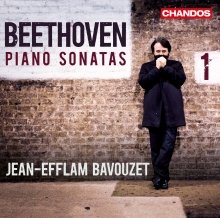 Ref: CHAN 10720(3) |
BEETHOVEN Sonatas Vol.1 Op2, Op7, Op10, Op13 "Pathétique", Op14John's CD of the week Classic FM April, 11th 2012REVIEWS FINANCIAL TIMES - May 25th 2012 ***** "This is one of the biggest discoveries I have come across in years." Andrew Clark The music is consistently engaging in its imaginative scope, stylistic freedom and technical fearlessness This is one of the biggest discoveries I have come across in years. I say “discoveries” guardedly, because Beethoven’s 32 sonatas are as much a staple of the record catalogue as they are of the concert repertoire: there is huge competition. But as anyone who has heard Bavouzet’s previous Chandos CDs (Haydn and Ravel) will know, he makes you listen to music as if you are discovering it Eureka!-style: yes, that’s what the composer must have meant. Bavouzet’s Beethoven – here embracing the first 10 sonatas, including the “Grande Sonate” and “Pathétique”, all written before 1800 – is consistently engaging in its imaginative scope, stylistic freedom and technical fearlessness. Rather than confining the three Op.2 sonatas to a classical straitjacket, he acknowledges the undercurrents of Beethovenian temperament, investing the Adagio of the A major sonata with defiant solemnity and the Scherzo with infectious wit – all the while achieving a quality of articulation that is exhilarating. Thereafter Bavouzet traces the music’s rising emotional temperature and exploding creative range with artless skill until, by the three Op.10 sonatas, we sense the composer’s psyche oscillating perilously between ecstasy and fragility, every extreme tempered by formal rigour: Bavouzet is at his very best where Beethoven asks most of his interpreter, notably in the titanic slow movement of the third sonata. As for the “Pathétique”, the Frenchman is on fire from first note to last. The only question now is: after such an outstanding start to his complete cycle, how can Bavouzet maintain this sense of discovery – and how long must we wait for the next instalment? By Andrew Clark NZHERALD - July 7th 2012 "Verdict: memorable Beethoven with Gallic elegance, fire and fervour." William Dart Jean-Efflam Bavouzet looks positively coy on the cover of his new Beethoven set and lightness and humour abound throughout the three discs. The French pianist made his name with Ravel and Haydn, and the older composer comes to mind when the opening theme of the first Sonata shoots elegantly upwards. The following slow movement is Haydnesque, yet its lovingly tended phrases, swathed in rubato, suggest a Romantic Age beckoning. Revelations are many. On the same disc, the witty Finale of a C major Sonata pits gleaming passagework against lean, almost sketch-like episodes. How beautifully Bavouzet gauges the massive chords that introduce the Pathetique Sonata and what a drama-filled narrative he makes of its first movement. A slightly later C minor Sonata (Op 10 no 1) can seem prosaic in the wrong hands; here it has fire and fervour. A few tracks on, a playful F major Presto sounds as if the composer is trying to contain a cheeky fugue in a pressure-cooker. At the other end of the spectrum, a D minor Largo e mesto is imbued with a sense of deep tragedy, laid out note by anguished note. As a bonus, Bavouzet offers two movements from Opus 10 no 1 that fell on the cutting-room floor, one a fascinating glimpse of some extra working-out that the composer intended for its Rondo. Bavouzet is in his prime and further Beethoven volumes are eagerly awaited. By William Dart INTERNATIONAL PIANO - September/October 2012 "Jean-Efflam Bavouzet is without doubt one of today's most intelligent and questing pianists". Colin Clarke Jean-Efflam Bavouzet is without doubt one of today's most intelligent and questing pianists. From Massenet to Ohana, from Stockhausen to Haydn, he seems to excel in all he touches. The freshness of his Haydn means that his affinity with early Beethoven should come as no surprise. Yet the mixing of Beethoven and French pianists has not always been a happy one; indeed, with the honourable exceptions of Walter Gieseking and Yves Nat, it is difficult to think of significant names (apologies to Pommier and Pludermacher), never mind trace a lineage. Bavouzet's F minor (Op 2 No 1) is most decidedly post-Haydn. He includes both repeats in the first movement. Traits that can be traced throughout this set become evident: carefully delineated textures, an awareness of caprice (Beethoven's wit, not Haydn's), and a thread of unquenchable energy unfettered by any technical concerns. Like some other pianists (Pollini springs to mind), Bavouzet sees these Op 2 sonatas as major statements rather than early works, something made clear by the depth of the slow movements. There is fire in his belly, too - he clearly finds the velocity of the F minor's finale irresistible (again, he includes the second half repeat). Dynamism wins over playfulness in Op 2 No 2. Once more, it is the slow movement that impresses the most, with its superb evocation of a pizzicato bass and its deliberately harsh sonorities, superbly caught by the Chandos recording team. The stunning articulation that characterised Bavouzet's Haydn recordings is carried over to his Beethoven, and Op 2 No 3 is the best showcase for this. He is keen to show the emotional scope of the piece, with the first movement containing musing mystery, and he is heard at his most sonically imposing in the slow movement (with its organ-like bass octaves). Beethoven's trajectory towards the 'Pathétique' continues with Bavouzet's incendiary Op 7 and its rapt, prophetic Largo con gran espressione. It is a pity we don't hear that trajectory in a linear listening; instead, we go from Op 7 straight to an impetuous, ferocious 'Pathétique' (Bavouzet attempts to render the sforzandos of the Grave via the pedal - many don't). The Allegro fizzes, and the return to the Grave is a true dramatic coup. The second disc ends with the two Op 14 sonatas, presented with such care that there is little doubt they should be included in the canon (not all pianists choose to include them). The three Op 10 sonatas provide a challenge, one Bavouzet rises to fearlessly. The first movement of the C minor is given surely the most jet-propelled reading in the catalogue, its first movement clipped and brusque to contrast with the exploratory Adagio molto. Bavouzet demonstrates the same superb control in the F major, enabling him to reveal the multifaceted Op 10 No 3 in all its variety. The two addenda add significant interest: a discarded Presto with Trio from Op 10 No 1, and the original finale with longer development (reconstructed by William Drabkin, who also provides fine booklet notes for this release). This is a significant, fascinating issue. By Colin Clarke WWW.CLASSICALSOURCE.COM "With good reason, Chandos is standing by its man Jean Efflam Bavouzet, the French pianist who has built up a wide-ranging discography, including Ravel, Debussy and Haydn. Despite the label’s existing Beethoven cycle with Louis Lortie, Chandos has produced its first Bavouzet volume of this music, which goes chronologically up to 1800. I’d expected Bavouzet would reference to his ongoing hugely impressive Haydn series, but he plays up the differences of Beethoven’s style with exhilarating incisiveness. The Opus 2 set of three works may all be dedicated to Haydn (“Joseph Haydn gewidmet”), but, from the rocket-like opening of the First (in F minor), Bavouzet leaves you in no doubt that this is music with its sights firmly fixed on the nineteenth-century, reinforced by his use of a particularly vivid Steinway (he played a Yamaha for the Haydn). Overall, Bavouzet’s phenomenally animated and articulated technique deals with all the details of Beethoven’s instructions with ease – phrasing, accents, dynamics and rhythm are impeccable, given further expression by Bavouzet’s intuitive feel for shades of colour, weight and rubato. Nothing is present for mannered effect, and his attention to the sonatas’ minutiae as well as their bigger picture gives these performances terrific immediacy. The Opus 2 set makes its mark brilliantly – the Prestissimo finale of the First is driven by Bavouzet’s tirelessly rippling left-hand; the C major (No.3) is a particular delight with its elegantly crafted graceful rondo; and the slow movements define the performances’ scope and spirit. If possible, Bavouzet is even better in the hugely demanding Opus 7, a grand sonata both in length and virtuosity, and he is completely up for the high-octane mood of the first movement and the otherworldly grace of the Largo. He finds a very different modus operandi in the ‘Pathétique’ – given with a fullness of tone and vision that honours Beethoven’s special relationship with the key of C minor. The Opus 10 set is, by any standards, superb, edged-on by Bavouzet’s fierce musicianship and an ear constantly tuned into the surging momentum of their narrative. The music sounds newly minted – and Bavouzet’s interaction with the slow movement of No.3 (in D minor) is a masterpiece of refinement and fantasy. The two smaller-scale Opus 14 sonatas are elegantly and affectionately played – you hardly ever hear them in a recital – and there are bonus tracks in the original third movement for Opus 10/1 (initially conceived in four) and the first version of the finale, as reconstructed by Beethoven scholar William Drabkin, who supplies an excellent, pithy booklet note. It’s right to break the strict sequence by placing the Opus 10 set together on one disc with the two grande sonates, Opuses 7 and 13, competing with each other in size and expression. Bavouzet’s playing shines a light on the prodigious confidence and brilliance of these early (1793-98) works, all composed when Beethoven was in his early-twenties. It will be fascinating to hear what Bavouzet does with the middle-period ‘Waldstein’ and ‘Appassionata’ as well as the far-seeing late sonatas." By Peter Reed |
|
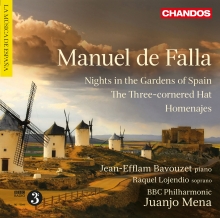 Ref: Chandos CHAN2010694 |
DE FALLA ¨Nights in the Garden of Spain¨ and other stage worksCD of the Month BBC Music Magazine March 2012CD of the Week The TIMES February, 5th 2012 REVIEWS RESMUSICA - February 20th 2012 "L'essence de De Falla avec Jean-Efflam Bavouzet et Mena : une des plus belles lectures disponibles et surtout l’une des plus personnelles du catalogue" Pierre-Jean Tribot Arrivé aux manettes du BBC Philharmonic, le chef d’orchestre espagnol Juanjo Mena reste fidèle à Chandos, le label historique de l’orchestre. À en juger par le titre donné à ce disque : «La Música de España », on peut supposer que ce premier volume sera la base d’une belle série consacrée aux compositeurs ibères. La finalisation d’un tel projet serait une merveilleuse idée tant les qualités du BBC Philharmonic de Manchester et le fini éditorial Chandos sont des atouts indéniables dans le marché actuel du disque. En attendant, Juanjo Mena signe un disque épatant et très personnel dédié De Falla. Dans El Sombrero de tres picos, il fuit toute vision d’une Espagne de carte postale ou de virtuose gratuit de l‘orchestre pour imposer De Falla tel qu’il est. On pointe donc un magnifique travail sur les timbres et la lisibilité des pupitres, en ligne droite de l’amour du compositeur pour Debussy, Dukas et Ravel, mais avec ses particularités : brio de la science orchestrale et violence éruptive. Les contrastes sont ainsi très marqués dans une lecture plus symphonique que chorégraphique mais qui travaille, jusqu’aux moindres détails, le matériau orchestral. La césure des thèmes et des climats n’est pas sans dérouter dans cette lecture anti-démagogique mais soignée et réfléchie comme jamais. On tient ici la grande référence moderne de la partition après les lectures indémodables d’Ansermet (Decca), d’Ozawa (DGG) et Boulez (Sony). Changement d’ambiance avec les teintes des Noches en los jardines de España où le chef est rejoint par Jean-Efflam Bavouzet. Ensemble, ils gravent une version presque définitive de ce chef d’œuvre. Juanjo Mena et son pianiste arrivent à cerner toutes les références stylistiques de De Falla tout en mettant en avant la modernité de l’écriture orchestrale. Debussy, Ravel mais aussi Liszt sont cités mais dans une optique un peu sèche, tel un impressionniste plus suggestif que sensoriel. Grand connaisseur et intégraliste de l’œuvre de Debussy (Chandos) et Ravel (MDG), Jean-Efflam Bavouzet sait replacer cette œuvre dans ses références historiques. Son toucher, un peu sec évoquant l’art de Jacques Février, Robert Casadesus ou Jean Doyen, très français, coloriste mais pas trop, évocateur mais pas narratif, soigne l’agogique et la philologie de cette partition. Les dosages, parfois infinitésimaux et le soin apporté aux dynamiques, complétés par une entente chef/orchestre exceptionnelle dans le partage d’une lecture aux ambitions communes, font de cette version une des plus belles lectures disponibles et surtout l’une des plus personnelles du catalogue avec celle du regretté Rafael Orozco et d’Edmon Colomer (Auvidis). Les classicistes ou les coloristes seront quant à eux fidèles aux disques d’Argerich/Baremboïm (Erato), Larrocha/De Burgos (Decca) ou des consensuels Colom/Pons (Harmonia/Mundi). Ce disque se clôt par une lecture vitaminée des Homenajes à Debussy et Dukas qui montre, dans ces saynètes instrumentales, à quel point le chef Juanjo Mena est impactant à la tête d’un orchestre stylistiquement d’une flexibilité sans faille. By Pierre-Jean Tribot |
|
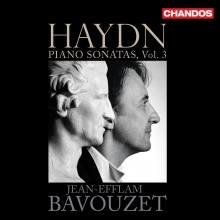 Ref: Chandos CHAN 10689 |
HAYDN Piano Sonatas Vol.3Best Instrumental of the Month - BBC Music MagazineEditor's Choice - Classic FM Magazine Critic's Choice - Gramophone REVIEWS Artistic Quality 10 Sound Quality 10 “If you’ve been collecting this series you won’t need any recommendation from me, if you haven’t been, you ought to start. Once again Jean-Efflam Bavouzet’s Haydn sweeps the field... Another great release in a standard-setting series.” David Hurwitz – ClassicsToday.com – 24 October 2011 “...Without letting personality obtrude, his [Bavouzet] approach is nevertheless uniquely personal. The subtlety, humour and grace of his playing is undergirded by a keenly perceptive intellectual grasp and unfailing musicality. No doubt these performances will afford pleasure and insight for many years to come.” Patrick Rucker – International Record Review – November 2011 “...This is sublime playing ... throughout, Bavouzet strikes an ideal balance between reticence and projection of personality. As he extends his project, sending irregular ‘postcards’ reflecting his passion for this ‘sublime music’, he pulls away from fin but selective interpreters ... staking a claim as Haydn’s greatest contemporary keyboard exponent.” Andy Hamilton – International Piano – November/December 2011 Editor’s Choice “A recording worth rushing to the shops for. Bavouzet plays these inventive masterpieces with real love.” ***** Charlotte Gardner – Classic FM magazine – November 2011 Instrumental Choice Performance ***** Recording ***** “This third disc in Jean-Efflam Bavouzet’s ongoing exploration of Haydn’s Keyboard Sonatas is the best yet...” Bayan Northcott – BBC Music magazine – November 2011 "...Bavouzet shows exquisite taste, always making us aware that behind Haydn’s classical lines lies a hugely inventive personality." Andrew Clark - The Financial Times - 3 September 2011 |
Play Audio Sample
|
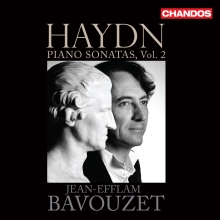 Ref: Chandos CHAN668 |
HAYDN Piano Sonatas Vol.2Supersonic - PizzicatoREVIEWS “…This was an hour of pleasure. It’s the second in a Haydn series. I am going to find the first one and keep an eye out for the others. So should you.” Stephen D Chakwin Jr – American Record Guide – September/October 2011 |
|
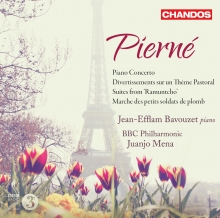 Ref: Chandos CHAN 10633 
|
Pierné: ConcertoEditor's Choice - GramophoneREVIEWS “…Mena rounds things out with one piece you’ll surely know, the March of the Little Lead Soldiers from a suite of piano pieces. This is actually the first piece on the program – a delectable aperitif. The sumptuous sounds taken down in New Broadcasting HOUse, Manchester will fill your from from floor to rafters.” Haller – American Record Guide – May/June 2011 Artistic Quality 10 Sound Quality 10 "These performances are stunning ... Jean-Efflam Bavouzet is an unbeatable soloist, and the orchestral playing under Mena is irreproachable ... plus terrific sonics and the result is simply irresistable. You’ll love this music." John Hurwitz - ClassicsToday.com - May 2011 “…Although this music is all about ear-pleasing charm, it comes across as far from lightweight when played with such flair and character. Juanjo Mena’s handling of pace and mood, though never obtrusive, is beautifully skilled.” **** Malcolm Hayes – Classic FM Magazine May 2011 “Very good recording, detailed and truthful sound.” *** Michel Fleury - Classica (France) – March 2011 **** Guy Engels - Pizzicato - March 2011 “Orchestral charm and craftsmanship revealed in a fine Philharmonic recital” “…For all those who delight in a wholly French grace and magic, this disc is a winner, and it is superbly recorded.” Bryce Morrison Gramophone - March 2011 "...Aiding the performers, the BBC Phil and Juanjo Mena a partnership to watch it seems, co-producers Brian Pidgeon and Mike George, together with Steven Rinker’s dynamic and gorgeous sound, have come up with a 2011 Winner long before such Awards have been nominated, let alone chosen. There’s enough Pierné, including some more piano-and-orchestra pieces, for a second volume. Hopefully." Colin Anderson theclassicalsource.com - 01 January 2011 Performance **** Recording **** “This attractive disc would make an ideal introduction to the charms of Pierne’s music.” Christopher Dingle BC Music Magazine - February 2011 |
|
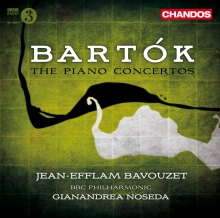 Ref: Chandos CHAN 10610 
|
BARTOK concertosOrchestral recording of the month andShortlist BBC Music Magazine Awards 2010 Editor's choice and Shortlist Gramophone Awards 2010 Album of the week - The Independent International Piano 'Choice' Pianist's Choice - Pianist Bartók: Piano Concertos – Jean-Efflam Bavouzet, BBC Philharmonic, Gianandrea NOSEDA REVIEWS “...These performances seemed immediately communicative; immediately right. Noseda and the BBC Philharmonic admirably second the sensitivity and strength of the soloist...” Ronald E Grames – Fanfare March/April 2011 ‘Over the years, Bartók’s Piano Concertos have been exceptionally well served on disc… Jean-Efflam Bavouzet can be added to this august list of interpreters, for these exciting and dynamic performances certainly match such rivals in terms of their visceral impact and musical insight… As always, Chandos cushions these fine performances in opulent sound but the piano is placed within the orchestra, enabling us to hear Bartók’s intricate contrapuntal lines with the greatest clarity.’ Erik Levi, BBC Music, October 2010 ‘If we are accustomed to hearing Jean-Efflam Bavouzet on discs of Debussy, Ravel, and Haydn, here he makes a radical move from those intimate, refined worlds to the raw dynamism of Bartók’s three piano concertos. In league with the finely honed BBC Philharmonic, these are performances vibrant in colour, vital in rhythm and detail and viscerally exciting in impact.’ Geoffrey Norris, The Daily Telegraph, 28 August “...the Chandos release keeps me riveted as I listen: the music unfolds gracefully and coherently, and the sparkling sonics allow me to savor Bartok’s orchestration in wonderful detail.” Haskins – American Record Guide – July/August 2011 ‘Pianists Choice’ “The intimate, chamber music give-and-take makes Bavouzets disc such a clear winner!” Marius Dawn The Pianist – April/May 2011 Interpretation ***** Sound ***** Repertoire ****** Carsten Dürer - Piano News (Germany ) – February 2011 **** - Excellent Stephane Friederich Classica - November 2010 “International Piano Choice” “…Right from the beginning of the First, the crystal clarity of Chandos’s recording is in evidence. The piano is placed with its percussion comrades, emphasising the vitality of the writing...” "...Recent Proms performances have underlined what a superb ensemble the BBC Philharmonic is under Noseda. The polish of its execution is remarkable. Superb.” Colin Clarke |
Play Audio Sample
|
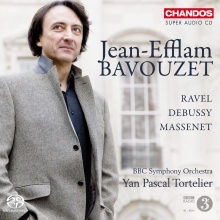 Ref: Chandos CHSA5084 

|
Ravel; Debussy; MassenetGramophone Awards 2011 - Category ConcertoBBC Awards 2012 - Category Orchestral Diapason d'Or - Diapason HIFI Year book 2011 REVIEWS “Editor’s Choice” “…It’s exceptional to have a soloist and conductor so in tune with each other in both Ravel concertos. This is a great partnership, a stunning disc and an early contender for those end-of-year awards.” ***** Jeremy Nicholas Classic FM Magazine - Janurary 2011 "...Wonderful playing and excellent orchestral accompaniments." Graham Rickson theartsdesk.com - 20 November 2010 “…Bavouzet is at his eloquent best in the slower movements.” Bavouzet plays all the music exquisitely. Never lacking power , his pianism is also elegant and feather light. The orchestra handles the concerti superbly and Tortelier conducts with style and authority.” JM Limelight - February 2011 “…Debussy’s little known Fantaisie for piano and orchestra is well worth hearing in Bavouzet’s thoughtful, idiomatic reading, and he uncovers a handful of piano solos by Massenet, the pick of which is an engaging Toccata. But the CD’s raison d’etre is the Ravel. Bavouzet’s G major concerto is the best since Michelangeli’s 50 years ago: it has style, verve, poetry and balance…” **** Andrew Clark The Financial Times - 15-16 January 2011 Performance ***** Recording **** “…This is a disc of pure pleasure…” Christopher Dingle BBC Music Magazine - January 2011 “Gramophone Recommends” “An all-too rare outing for Debussy’s luxuriant Fantasie makes this a must.” “…The combination of all three works on a single CD creates a satisfying programme, especially when played with such finesse and limpid colouring as by Jean-Efflam Bavouzet, with Yan Pascal Tortelier and the BBC SO matching hime in taste and eloquence.” Geoffrey Norris Gramophone - December 2010 “The ebullient French pianist Bavouzet scales the heights in this splendid and generous CD with the BBC Symphony Orchestra …” ***** Geoff Brown The Times - 13 November 2010 |
|
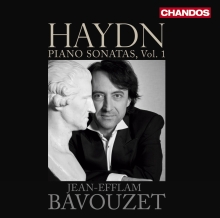 Ref: Chandos CHAN 10586 
|
HAYDN Piano Sonatas Vol.1CHOC de l'Année 2010 - CLASSICACD of the Week - Sunday Times CD of the Week - The Independant International Piano 'Choice' REVIEWS “Unadulterated bliss.” SUNDAY TIMES ¨We badly need a great Haydn sonata cycle on a modern instrument, and on evidence here Jean-Efflam Bavouzet’s promises to be just the ticket.¨ CLASSICSTODAY Interpretation ****** Sound ***** Repertoire ***** Marco Frei Piano News - Germany - July/August 2010 ***** Riccardo Risaliti Musica - May 2010 International Piano Choice “Every second of this CD is a delight, with Bavouzet’s artistry carrying anything that might sound routine.” Michael Church International Piano Magazine - May/June 2010 Artistic Quality – 10 Sound Quality – 10 “We badly need a great Haydn sonata cycle on a modern instrument, and on evidence here Jean-Efflam Bavouzet’s promises to be just the ticket. It’s fabulous, as wonderful in its own way as was his Debussy cycle for this same label. His approach couldn’t be more intelligent …” “Interpretively, this is as good as it gets.” “The sonics are totally at one with the performances: brilliantly vivid, but never hard. I can’t wait for Volume 2.” David Huwitz ClassicToday.com ‘Editor’s Choice’ “Bavouzet turns from Debussy to Haydn with vivid results.” “Clarity and control from Bavouzet.” “… the first disc in what I hope will be a long and comprehensive series.” David Threasher Gramophone - May 2010 “The French pianist renowned for Debussy has now turned his attention to Haydn, and the results are effervescent and dazzling.” Nicholas Kenyon The Observer - 4 April 2010 CD of the Week “Unadulterated bliss.” ***** Hugh Canning The Sunday Times - 28 March 2010 “The first volume of a projected collection of the complete sonatas, this delightful disc contains four pieces across a 15-year period when the fortepiano was supplanting the harpsichord. Unlike Mozart’s sonatas, they still have a Baroque feel which Bavouzet doesn’t seek to play down, and he conveys Haydn’s impish spirit with the utmost clarity.” **** Paul Gent The Telegraph - 26 March 2010 "...this first disc [Haydn series] suggests that however extensive his survey turns out to be, the results should be well worth hearing." "...Though he exploits all the tonal possibilities of the modern concert grand, Bavouzet also makes full use of the latest ideas on performance practice...It’s the best kind of historically alert piano playing." **** Andrew Clements The Guardian - 26 March 2010 “…This first release is a long-term series offers four sonatas, dispatched with scintillating brightness and many ornamental trills. Bavouzet’s fingers are so spiky and sprightly that you might yearn for some flowing legato. It’s impossible not too be impressed, though, by the grand carnival of the relatively lengthy No 31 in A flat.” Geoff Brown The Times - 13 March 2010 Performance **** Recording **** Bayan Northcott BBC Music Magazine - April 2010 “…Bavouzet seems completely in his element throughout this fine disc, the recorded sound is close but natural, and the booklet notes by Marc Vigal are as elegant and insightful as the playing. I look forward to the next volume in this series.” Charles Timbrell International Record Review - March 2010 “…Altogether, this beautifully recorded disc promises well for another classic Bavouzet set to compliment his prize-winning Debussy recordings.” ***** Jeremy Nicholas Classic FM Magazine - April 2010 Album of the Week’ “…Bavouzet shines brilliantly in Haydn’s first ‘great concert sonata’, but he is just as good with the intimate moments: roll on the rest CD in this complete cycle.” Michael Church The Independent - 27 February 2010 |
|
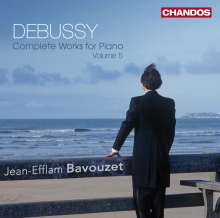 Ref: Chandos CHAN 10545 

|
DEBUSSY Complete Piano Works Vol.5Best Instrumental Recording - ICMA Award 2010Editor's Choice - Gramophone Shortlist Awards 2010 - Gramophone Editor.s Choice - Classic FM Magazine Supersonic - Pizzicato REVIEWS “…I am convinced by his [Bavouzet] performances that this is all legitimate piano music by one of the 20th Century’s great masters, heretofore almost unkown, and now presented with Chandos’s top production values and recording techniques. There is not another pianist more suitable or capable of bringing this music to light.” James Harrington American Record Guide - March/April 2010 **** Stephane Friederich de Classica - March 2010 “This splendid appendage to Jean-Efflam Bavouzet’s much-praised Debussy series is in man ways the most revelatory of all. In bringing together these three contemporaneous ballets, in the detailed versions for solo piano that Debussy wrote as short scores before orchestration, Bavouzet casts fresh light on a little-known area of this composer’s output.” “…The recorded sound is excellent, as with all these volumes. Enthusiastically, if superfluously, recommended.” Tim Parry International Piano Magazine - March/April 2010 “…this is a marvellous disc and the climax in so many ways of Bavouzet’s complete Debussy cycle. “ Gary Higginson MusicWeb International - 10 February 2010 “The fifth volume of Jean-Efflam Bavouzet’s survey of the complete piano music of Claude Debussy is at least as fine as the previous four, and perhaps even more interesting. Throughout this series, Bavouzet has shown himself to be not only a stupendous virtuoso -- nothing in the Études or the Préludes is technically beyond him -- but also an exemplary Debussy pianist. He knows how to blend, balance, shade, and shadow so that the music always sounds like it is by Debussy and no other composer. In this volume, Bavouzet takes on three works rarely programmed or recorded in any form and plays them in their nearly unknown piano versions: the ballets Khamma, Jeux, and La boîte à joujoux. Though the piano versions were intended only as aids for dance rehearsal and not as a substitute for the full scores, they prove wholly persuasive in these performances. Bavouzet tosses off the most challenging passages as easily as if they were five-finger exercises, but more importantly, he makes compelling cases for these rare pieces, revealing each as a fully worthy work, something at which many conductors have failed. Though no fan of the composer should be without the orchestral versions of these scores, this disc should be of interest to anyone who loves Debussy. Chandos’ digital sound is warm, deep, detailed, and colorful.” Jim Leonard AllMusic.com - February 2010 “…This is an unusual and valuable capper to one of the two or three greatest Debussy piano cycles on disc – not to be missed.” Artistic Quality - 10 Sound Quality 10 Jed Distler ClassicsToday.com - 27 November 2009 “These three works are piano versions of ballet music intended for full orchestra; Debussy never finished orchestrating Khamma and its completion was left to Charles Koechlin. But with performances on solo piano of such vivid colours, such superbly voiced textures and such flair nuance and richness of atmosphere, who needs orchestras anyway? It’s magnificent playing.” *** Editor’s Choice *** Jesssica Duchen Classic FM MAgazine - December 09 “A marvellous conclusion to Bavouzet’s absolutely essential Debussy series” “Altogether, a remarkable achievement, and the disc is every bit as essential – perhaps more so for the rarity of the repertoire – as previous instalments” **** Editor’s Choice **** Harriet Smith Gramophone - November 2009 Performance **** Recording **** Christopher Dingle BBC Music Magazine - December 2009 “Jean-Efflam Bavouzet concludes his stellar traversal of Debussy’s complete piano works with the composer’s rarely heard ‘short scores’ of his three late ballets. Debussy devotees will already own the orchestral versions of these works, but I highly recommend Bavouzet’s accounts. He approaches the pieces on their own terms, seems to know the orchestral versions intimately and realizes every bar of the music imaginatively and effortlessly. Other versions might be competitive, but they are few and far between. What Bavouzet provides is a perfect conclusion to his complete five-disc Debussy, a remarkable achievement that I have followed from the beginning and now consider the best of all presently available. The recorded sound is exceptional and the booklet notes by Roger Nichols are, as always, concise and informed." Charles Timbrell International Record Review - December 2009 “His [Bavouzet]accounts of all three pieces are graphic and meticulous.” Paul Driver Sunday Times - 22 November 2009 “Bavouzet’s survey of Debussy’s piano music seemed to have come to a natural end with his outstanding disc of the two books of Images and the complete Studies, released by Chandos a year ago. But this collection of three scores that are far better known in their orchestral versions … is an unexpected bonus. In all three works, Bavouzet’s exceptional control, variation of touch and keyboard colour regularly provide new insights.” Andrew Clements The Guardian - 20 November 2009 |
|
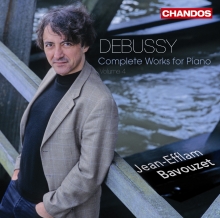 Ref: Chandos CHAN 10497 

|
DEBUSSY Complete Piano Works Vol.4Best Instrumental Recording - Gramophone Award 2009Editor's Choice - Gramophone Best Instrumental Recording of Standart Repertoire - Internatioal Piano Magazine REVIEWS Bavouzet is a fascinating Debussy player, not only because of his immensely refined ear for sonority but also his rhythmic flexibility allied to a strong sense of musical architecture… The piano sound is clear and warm and this is an ideal match for Bavouzet’s lucid approach to the music. The transparency of textures is one reason his performance of the Images is so effective, revealing much of the inner life of this music, but there is never any sense of dryness. Not only is there an impressive range of colour but the pianist also shows a willingness to use the dynamic range of the piano to the full and there is quite a bit of rubato too. However, this never feels like someone pulling the music around for the sake of it. Quite the reverse – Bavouzet’s rhythmic give and take enhances the expressiveness of the music. International Record Review This is meaty and powerful Debussy without the cheap perfume or the soggy handshake. The Etudes are especially convincing...Trust me, both the Images and Etudes easily conquer any other modern recording. Pianist I can guarantee readers that this attractively engineered release will reveal more and more details to savour with each rehearing. If you haven’t ordered it yet, what are you waiting for? Gramophone CD of the Month Bavouzet’s recording contains many beauties: a clear and shining tone, elegantly limpid turns of phrases and all the virtuoso glitter you could wish for. Classic FM Magazine Anyone who doubts Bavouzet’s abilities should sample the playful romp though the third of the Images, the quasi-Etude ‘Mouvement’, or his beautifully atmospheric ‘et la lune descend sur le temple qui fut’ BBC Music Magazine This is the fourth and final disc in Jean-Efflam Bavouzet’s Debussy series for Chandos, and perhaps the most impressive… Bavouzet’s performances manage to reconcile perfectly those echoes of the earlier sensuous writing with the newly invented, harder-edged sonorities. He is just as convincing in the two sets on Images as well, whether perfectly gilding the swoops and swirls of Poissons d’Or, or evoking the stately monumentality of Hommage à Rameau. The Guardian |
|
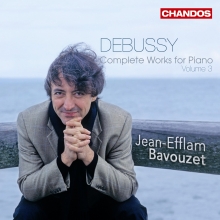 Ref: Chandos CHAN10467 

|
DEBUSSY Complete Piano Works Vol.3Best Instrumental Recording - BBC Music Magazine Award 2009CHOC de l'Année 2008 - Le Monde de la Musique 10 BEST CD of 2008 - ClassicsToday.com REVIEWS ...rarely in my experience has a pianist so faultlessly or precisely achieved his aims...Gramophone … this penultimate volume featuring a masterly account of Suite Bergamasque and one of the finest Children’s Corners ever recorded The Pianist He has also reached his third offering and this delightful disc places Debussy’s two most modest cycles within a broadly chronological sequence of pieces spanning the composer’s career. As such it would make an excellent introduction both to the essentials of Debussy’s piano writing and the extraordinary evolution in style. Bavouzet is an engaging guide on this journey. BBC Music Magazine Regardless of style or pianistic requirements, Bavouzet is equally in charge of all dimensions of Debussy’s music. His acute sense of proportion covers both the rhythmic and dynamic spheres; in the Arabesque No. 1, for example, his subtle rubato shapes the flow of the piece most affectionately without ever becoming mannered. He adopts a different approach for the early danse bohémienne and Mazurka, delivering both with crisp vitality and winsome charm. International Record Review Popular Debussy rubs shoulders with the unfamiliar in refined, intimate and richly rewarding readings. Classic FM Magazine This third volume confirms Jean-Efflam Bavouzet’s winning affinity for Debussy’s music. The Telegraph Once more he turns the conventional notions of ‘impressionism’ topsy-turvy, cleansing Debussy of years of dust and accretion and recreating him in every bar in a sparkling and pristine light. Fiercely energised yet superfine, his performances are not for those woth comfortable drawing-room notions of Debussy, and rarely in my experience has a pianist so faultlessly or precisely achieved his aims. Gramophone One would expect a work like Clair de Lune to be just about perfect in the hands of such a skilled and sensitive pianist, but for him to give the same attention to the other three less familiar movements of the Suite Bergamasque places this performance among the best one could ever hope for. The same holds true for Children’s Corner, most definitely on a par with my favourite old Michelangeli recording American Record Guide |
|
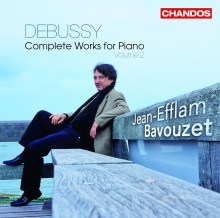 Ref: Chandos CHAN10443 

|
DEBUSSY Complete Piano Works Vol.2DIAPASON d'OR 2008 - DiapasonEditor's choice and Awards 2009 shortlisted - Gramophone Instrumental CD of the Month - Classic FM Magazine Awards shortlisted MIDEM 2009 REVIEWS ...a dream-world, revelling in the music’s multi-layered sonic terracing with a captivating range of keyboard touch and micro-pedalling…. Playing that takes us through new realms of experience.... Bavouzet plays even such neglected gems as the Ballad and Valse romantique as though he were suspended in a dream-world, revelling in the music’s multi-layered sonic terracing with a captivating range of keyboard touch and micro-pedalling…. Playing that takes us through new realms of experience. I had the highest praise for Jean-Efflam Bavouzet’s first volume of Debussy, and the present disc is fully the equal of that one in terms of colour, refinement of touch, spontaneity and technical finish… Bavouzet has written that his Debussy playing has been influenced by that of Gieseking, Michelangeli and Richter. You may hear something of each of these pianists in his playing but more then that you will hear his own distinctive and special voice. INTERNATIONAL RECORD REVIEW This second volume of Jean-Efflam Bavouzet’s Debussy cycle reveals the intelligence of his programming. A trio of three-movement works is at its heart, but the disc opens and closes with two further triptychs, pseudo-cycles of contemporaneous pieces usually heard in isolation. Bavouzet’s strengths are also to the fore, with glowing colours in the opening Ballade and Valse romantique followed by sparkling elegance in the Danse. BBC MUSIC MAGAZINE |
Play Audio Sample
|
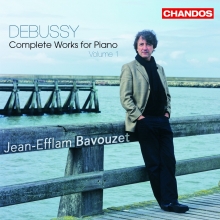 Ref: Chandos CHAN 10421 
|
DEBUSSY Complete Piano Works Vol.1CHOC de l'Année 2007 - Monde de la MusiquePianist's Choice - Piano Magazine Sunday Times CD of the week 29/7/07 REVIEWS "... If asked to encapsulate Jean-Efflam Bavouzet’s highly anticipated Debussy Préludes in two words or less, I’d say ‘con amore’" GRAMOPHONE "There is an emotional directness about Bavouzet’s Debussy that is reminiscent of the great Samson Francois, tempered by a palette of glowing autumnal colours more in line with Gordon Fergus-Thompson’s outstanding series for ASV. Blessed with outstanding Ralph Couzens sound, this bodes well for future releases." CLASSIC FM MAGAZINE "The French pianist Jean-Efflam Bavouzet has already won plaudits for his Ravel on disc [not on Chandos] and here he launches a new complete cycle of Debussy’s piano works with an exceptionally fine recording of the two books of Préludes (plus a recently discovered Baudelaire-inspired envoi written for his coalman).There is a clarity about much of Bavouzet’s playing that both illuminates Debussy’s often complex textures and delineates the composer’s typical splashes of melody. But there is no shortage of hazy atmosphere when required and his Des par sur la niege is shot through with aching melancholy. At the same time his rhythmic acuteness gives pieces like La Sérénade interompue and La Puerto del vino a crisp momentum of their own, while the more Lisztian pieces – Ce qu’a vu vent d’ouest and Feux d’artifice, for example – are played with panache. With such absorbing playing and excellent sound, this disc augurs well for the rest of the cycle." THE TELEGRAPH "This generous first instalment of a projected complete cycle not only squeezes both books of Preludes onto a single disc, but also includes the recently discovered ‘Les soire illumines par l’ardeur du charbon’ as a welcome pendant. Jean-Efflam Bavouzet has a wonderfully light touch, imbuing ‘Les collines d’Ancapri’ with a skittish exuberance, or creating delicate wisps of mist in ‘Brouillards’ evoking Debussy’s advice to forget that the piano has hammers." BBC MUSIC MAGAZINE "If asked to encapsulate Jean-Efflam Bavouzet’s highly anticipated Debussy Préludes in two words or less, I’d say ‘con amore’. Given the stunning excellence of his Ravel and Liszt releases [not on Chandos], it’s no surprise that Bavouzet commands all the shading, nuance and timbral sensitivity one expects in Debussy, together with virtuoso flair and characterful spontaneity that adds welcome backbone to the composer’s ‘hammerless’ aesthetic… Chandos provides excellent sound and scholarly, informative notes by Roger Nichols." GRAMOPHONE "He must be one of the least-known contemporary French pianists in this country, but here he announces himself as a peerless Debussyite in the oft-recorded Préludes (Books 1 and 2) and, as an encore a piece discovered as recently as 2001… Bavouzet’s commend of touch, colour and rhythmic vitality are all that one could ask for in the Préludes, and he has a native feeling for the evocative atmosphere of these widely contrasting yet strangely unified pieces… This is essential Debussy, immaculately realised." SUNDAY TIMES "Absorbing playing from a French pianist with something new to say about these much-recorded piano masterpieces, and an interpretative range that calls upon clarity, haziness and Lisztian panache as appropiate." TELEGRAPH 'CDS OF THE YEAR' "He brings a rare combination of colourism, textural definition and rhythmic alacrity to Debussy’s 24 Préludes, conveying the character of each of them with a disarming ease that serves the music in an ideal way. He finds a perfect balance between thoughtfulness and spontaneity, is in command of a wide variety of touches and dynamics and is faithful both to the letter and intent of the musical text. Unlike some pianists he can make the difference between tenuto and portato audible without exaggeration and he seems mercifully uninterested in self-concious trickery with the middle pedal… In short, this is one of the finest accounts of the 24 Préludes that I know, surpassing in many ways the classic accounts by Gieseking, Paul Jacobs and more recently Jean-Yves Thibaudet." INTERNATIONAL RECORD REVIEW "What makes Bavouzet stand out is not only his fresh approach to tempo, but also his Classical way of drawing attention to the structural form of each prelude. His ‘Minstrels’ are humorous and light-footed, his blowing wind from the west tumultuous and the final firework catapults him to the stars." PIANIST "Bavouzet is not yet as widely known as some, yet the quality of this disc suggests the discovery of a major talent in the Impressionist repertoire. Indeed, there is a conviction and authority to his playing that genuinely merits comparison with Gieseking and Michelangeli and that impresses with its natural ‘rightness’ – a quality of integrity and humanity and the strong feeling that the music is the outcome of spontaneous improvisation." INTERNATIONAL PIANO |
|
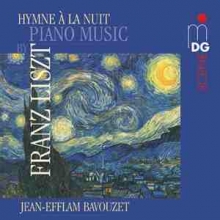 Ref: MDG 604 1350-2 |
LISZT RecitalREVIEWS "Hats off! A genius Liszt player!...A very special disc, not to be missed" Jed Distler "A superb recital, excellently recorded and delivered by a pianist of real stature" Colin Clark Bavouzet plays these interpretatively difficult works with a huge amount of assurance. Late Liszt is notoriously tricky – not for the notes themselves, but for what lies beneath them. Bavouzet takes a selection of works from the late period, mixing in some of the more nocturnal earlier ones as well as weaving in some Tristan, a stroke that makes the Wagner-Liszt connection explicit. Night, death and love-in-death interact to make for a memorable listening experience. How refreshing it is to have a disc that forces one to think, to reflect and, above all, to make an effort in the listening process. For all of this, Bavouzt is to be congratulated. His pianism is fine, too. His Harmonic Classic disc of solo works by Schumann is a fine one (Opp. 14-16). Now here on Dabringhaus he brings his fine technique and intellect to Liszt. The title, 'Hymn to the night', is taken from the second work in the programme. Bavouzet explores Liszt's various reactions to the concept of night, from Cradle Song to insomnia (Schlaflos), from Funeral March to the nocturne, En rêve. The recital begins with the short Invocation. Yet within its three minutes it contains a huge amount of power, and Bavouzet is Bolet-like in his depth of tone. Based on the eternal voice of the soul, Bavouzet's depth of interpretative response sets the tone for the rest of the disc. We hear both of the S173a Hymns, but separated by six other works. The Hymne à la nuit depicts the close of day shorouded in the Divine. Bavouzet exhibits a wonderful pianissimo and great delicacy (a joy to hear chordal work so together). The Wiegenlied's hyper-delicacy represents one aspect of sleep – Schlaflos, of course, another, with its characteristic late-Lisztian single lines so full of meaing and its disturbing, restless harmonies. In complete contrast comes the extended Grosses Konzertsolo. This work also exists in a two piano version as Concerto pathéique (interestingly, Mark and Michal Hambourg's 1934 version of this has recently become available on CD on APR7040, an intensely involving experience). Bavouzet creates an exciting experience, enjoying the double-octaves and later suggesting recitative with his left hand lines. Most impressive though are the fantasy he displays in the slower section and the way he refuses to break his tone even in the most vehement fortissimo. The brief but sugnificant Bagatelle without tonality separates this from another extended item, La notte. In the Bagatelle, Bavouzet somehow projects the waltz element, the diabolical element and the essence of late Liszt in less than three minutes. La notte, a work that derives from Il penseroso (inspired by Michelangelo's sculpture) is Lisztian darkness exemplified. Bavouzet paces the slower sections perfectly, bringing an impressive tread to the bass ostinato soon before the work's conclusion. The Trauervorspiel und Trauermarsch represents a deconstructed march (and includes some very telling single lines around five minutes in); the rustlings (almost watery!) of the Hymne du matin provide telling contrast. The Tristan Prelude and Transfiguration is interesting in juxtaposing Kocsis and Liszt's responses to Wagner's orchestral score. Kocsis had a hard job – the long lines are going to be difficult to sustain on a piano, yet Bavouzet's carefully-chosen tempo and his full-on concentration enable the spirit of the original to shine through. It is true that Kocsis' transcription does not rise to Liszt's heights in the Transfiguration and it is here that Bavouzet is at his best, rising naturally to a full-blown (but not over-blown) climax. Finalle, En rêve, an exercise in pianistic stasis. This is a real jewel of a piece, and suffice it to say that Bavouzet treats it with the reverence it deserves. A superb recital, excellently recorded and delivered by a pianist of real stature. Colin Clarke MUSICWEB Hats off! A genius Liszt player! Not only does Jean-Efflam Bavouzet possess a perfect technique, but he also commands the huge, varied sonority and narrative power needed to make Liszt'sP complex idiom come brilliantly alive. All the great dead Liszt players knew how to balance tremolos, arpeggios, and similar background devices against melodic components so that the textures would sing out with variety and color, emerge in proper perspective, and never, ever bog down. They also knew to serve Liszt's "stagy" lyrical inspirations wholeheartedly and generously. Bavouzet knows these secrets, and has totally internalized them. That's why the Invocation's bass rumbles and rattling tremolos sound uplifting rather than bombastic (the same goes for the ending of the gorgeously paced Wagner/Liszt Liebestod), or why En réve's lyric simplicity sounds contained and dignified rather than mawkish. The Grosses Konzertsolo, a prototype for Liszt's two-piano Concerto Pathétique, receives a blazing, utterly inspired reading where fire and poetry lock horns and never let up. It puts all other recorded performances of this piece in the shade (not that there've been that many, I admit). Similarly, the rarely heard La Notte boasts such high levels of pianistic finish and stylish elegance that you'll never need to hear the piece in its orchestral version again--that is, if you've heard it, ever! As for being an orchestra, and a sexy one at that, look no further than Bavouzet's remarkable playing of Wagner's Prelude to Tristan und Isolde in Zoltan Kocsis' transcription. Conversely, the bleak, anti-virtuosic sound world of late Liszt also sparks Bavouzet's imagination. For example, he judges the odd chromatic twists and turns of Schlaflos in a more fluid fashion than Paul Lewis' fine recording on Harmonia Mundi. Although the excellent annotations do not mention the instrument, the sound of the piano itself leads me to suspect that Bavouzet employs the same vintage 1901 Steinway he used in his MDG Ravel cycle. It relates to a modern American Steinway much as a hand-carved oakwood table does to a factory-made Formica copy. The harp-like, disembodied quality of soft, rippling passages suggests the "piano without hammers" of Debussy's ideal. No doubt Liszt would have liked it too, and possibly would have enjoyed Bavouzet's meaningful, committed and loving interpretations even more. A very special disc, not to be missed. [2/3/2006] --Jed Distler CLASSICTODAY |
Play Audio Sample
|
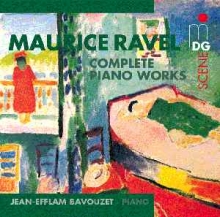 Ref: MDG 604 1190-2 

|
Ravel: Complete Solo WorksDiapason d'Or - DiapasonCHOC - Le Monde de la Musique |
Play Audio Sample
|
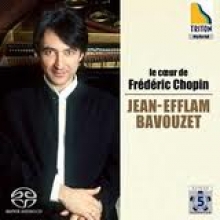 |
CHOPIN |
|
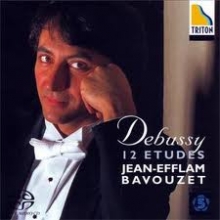 |
DEBUSSY EtudesPony Canyon |
|
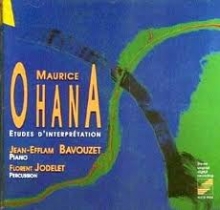 
|
Ohana: 12 Etudes d' Interprétation Harmonic RecordsREVIEWS Maurice Ohana is a fascinating figure in 20th century French music. I first came across his work about 12 years ago. I was gripped by the orchestral work ‘Le livre de Prodiges’ of 1979 (Erato 2292-45503-2). The angel of inspiration that touched Olivier Messiaen also touched Ohana. However there is another aspect to his work not often present in that orchestral work but which is certainly found in others. This is his love of and fascination for African music. This led to his use of quarter-tones and of percussion instruments.. These interests are found also in the next work I investigated ‘Avoaha’ (1991) for vocal ensemble and percussion (Opus 111 Ops 30-109) with its texts in African and, just recently, ‘Office des Oracles’ of 1974 (Opus 111 Ops 30-246). This partially takes its inspiration from Afro-Cuban ceremonial; again scored for voices and percussion. With his emphasis on percussion it should seem to be no big surprise that the last two of these piano studies has an equal role for a percussionist who plays a variety of instruments, including tam-tams, Chinese cymbals, bongos and a bell-tree! It’s interesting, briefly, to consider two other recent sets of piano studies. Those of Ligeti are, I believe, still work in progress. The recording by Pierre-Laurent Aimard on Sony (SK 62308) is very fine indeed. Ligeti puts the studies into two groups: the first is a group of six (1985) the second, a group of eight (1988-93), are still developing. Ligeti draws on a wide variety of techniques and styles. He also is interested in African rhythms as in ‘Automne a Varsovie’ (set 1 no 6). Ligeti is also drawn to Conlon Nancarrow’s Studies for player piano (1960s), which are fiercely difficult with their use of polyrhythms (RCA 09026 61180-2). Maurice Ohana is not interested in compositional techniques for their own sake. His fascination, like that of many French composers of the last century, is with sonority. So these are studies almost entirely in sonority. Sometimes these are engendered by rhythmic displays but more often by a sheer joy of sound for its own sake, just like Debussy, even Boulez, and certainly Messiaen before him. Perhaps the Messiaen of the Preludes (1929) comes to mind and the Debussy of his remarkable Studies (1915). Although influences are easy to spot at the end of it lies a very individual voice, which surfaces regularly and yet quietly and modestly, through a haze of colour. So to give you three brief examples; No 2 ‘Mouvements paralleles’ begins with the hands playing a melody in minor 9ths five octaves apart, before changing into a brief, fast Toccata. Book 2 no. 1 in memory of Bartók has a pure "diatonic opening melody which eventually" becomes "stuffed with dense chords". The performer is asked "to ‘colour’ the sound so that a marimba is conjured up". Book 2 no 3 ‘Contrepoints libres’ is notated on superimposed staves and is barless. It develops with trills, superimposed clusters and fast runs but began with delicate coruscating lines in counterpoint with a static bass. So many nuances, so many new piano sounds - it’s difficult not to go on. It seems to me that Jean-Efflam Bavouzet is an ideal interpreter of this music. His biography is given in the booklet but significantly he was friend of the composer’s and has played Stockhausen. He knows the music intimately, which is vital. Speaking of the booklet notes by Harry Halbreich, I found them extensive and useful but my wife, a non-musician found them too technical. Each study is discussed in some detail and a careful reading proves that each piece has its own sound-world and character. The recording made at this favourite venue of various French labels, is in every way quite excellent. Gary Higginson |
|
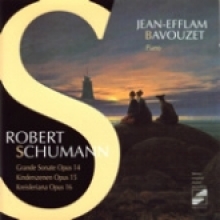 |
Schumann: Op14, Op15, Op16 |
|
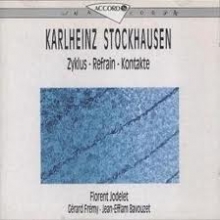 Ref: Accord – 202742 |
Stockhausen: Refrain - Zyklus - KontakteRefrain - Zyklus - Kontaktewith Florent JODELET (percussion) and Gérard FRÉMY (piano) |
|
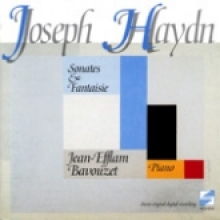 
|
HAYDN Sonatas and FantaisieChoc Monde de la MusiqueSelected among the 150 best recordings by Le Monde REVIEW |
|
^ back to top
